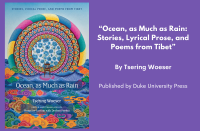
High Peaks Pure Earth has translated an essay from WeChat on fishing and eating fish.
The essay titled “From Taboo to Eating Fish” is from the “Aro Tibetan” WeChat Channel and was published on January 15, 2015. The essay examines Tibetan attitudes to fishing and eating fish, looking at where the taboo comes from and changing societal norms. From the post it appears that the author is relatively young and comes from Kham (an area in Kham that is in today’s Sichuan Province).
Alai’s short story The Fish, that prompted this essay, can be found in English translation in the volume Tibetan Soul.
This post will be followed by a more recent article next week on the same topic.
“From Taboo to Eating Fish”
Recently, I have had so little to do and been so bored that I browsed through the collected works of Alai. They contained one essay that had the following title: The Fish. It touched upon Tibetan people’s custom of not eating fish. According to Alai’s explanation, it is because in the past, water burials were very common on the grasslands, letting water and fish dispel bodies of the deceased; hence, for many Tibetans, fish represents a taboo. But then, following Alai’s logic, wouldn’t Tibetans also be forbidden from drinking water? Of course, not all customs or habits follow logic or sense. Alai’s essay mentions the discussion in one of the books of Professor Dhondup Wangben of Minzu University, on the Tibetan fish taboo. The narrative is that when Tibetans perform the ritual of exorcising or disposing of unclean things, they have to curse all the invisible but haunted matters surrounding them and then take them from their homes, their land, their souls and throw them into the water. Accordingly, the fish in the water become a kind of host for all those unwanted matters. The two versions are very similar, but they both don’t really convince a fish-eater who grew up in a non-fish eating place, as I am. Many Tibetans are not at all unfamiliar with fish, they have images of the eight auspicious signs at home. And the two fish that are part of them, have a very special and auspicious meaning: Fish swim freely through water, which in Buddhism stands as a metaphor for fertility and abundance and also for complete freedom. So how can Alai argue that fish are unclean? Who would keep an unclean thing on his or her wall and even pray to it? Well, since I have nothing else to do, let me also use fish to write a few words.
When Alai first went fishing he was already grown up, he was already a famous author. The first time he went fishing was to surmount himself or to surmount the traditions binding him. I don’t remember anymore when I went fishing for the first time, but I cannot forget the feeling; today, as soon as I think about the quite cruel methods of fishing, of how the hook pricks into the fish, sometimes ripping open its intestines, mostly cutting a hole into its mouth, I get goosebumps. It seems that despite being younger than Alai, I am becoming ever more outdated as I grow older. If I have been bound by traditions, well then I have really been bound by them, to an extent that nothing can ever save me again.
When I think back to my childhood memories of fishing, my head is full of fondness. Every time we went fishing, it was an adventure, I was excited. I say excited, because we kids had to escape from the sight of the adults and venture down to the river where they could not see us. We remembered where we could find fish, namely where the river water was quite warm. Before going, we had to prepare our fishing gear. Usually, we would steal the sewing kit from home. As for the bait, we would take some earthworms and some soil from one of the home’s gardens, wrap them in a plastic bag and put them in our pockets. All this had to be done under the eyes of the adults. If a kid who normally never goes into the garden is suddenly seen digging away, it would definitely alert the parents. If he was found out, he would definitely suffer some painful beatings. Unless he was from a Chinese family.
There was one of those Chinese kids among us, he would always appear in our village during winter and summer holidays. He was also the one who taught us how to fish. That skill gave him lots of playmates in the village, including me. Back then, we never discriminated against or excluded a new kid; on the contrary, whenever he returned, we were all very happy, always hoping that he would bring us some new things. And he would never disappoint us. Later, he taught us how to turn a forked branch and the inner parts of a bicycle tyre into a slingshot to hunt down birds. We would then eat roasted birds. I am so glad that back then, Tibetans were no longer so opposed to anything new coming from the outside, otherwise much of my happy childhood would have been erased.
After stealing the sewing kit and the earthworms we could still not go fishing happily. If we were unlucky and passing by adults saw us fishing, they would hardly ever let us be. The people we were most afraid of meeting while fishing were monks. At the time, for us children, encountering robes was even more scary than encountering a ghost in the middle of the night. Elderly monks would rarely leave the monastery, so those who would potentially pass by us were the young and strong ones. In order to constantly pursue their aim of rescuing living beings, they would not refrain from catching a group of kids and turning us upside down. They often took the fish that we had caught and threw them back into the water; or they would throw the bait into the highland barley fields; they would also confiscate our fishing line and hook. If we did not suffer a painful beating, we considered ourselves lucky. Sometimes, if they knew us, they would even report us to our parents and thus, prolong the painful process. Back then, my impression of monks was really not that great.
So my childhood memories of fish are more or less like that. In fact, I started eating fish from a very young age, to the point that I don’t even remember the first time that a fishbone got stuck in my throat. My maternal grandfather is Chinese, and my mother grew up with him when she was young, which is probably why they passed the fish eating habit on to me and my elder brother. Until the present day, I have maintained this habit that makes me stand apart from many of my friends and classmates. It is not because I particularly like the smell of fish, but because many people don’t eat it. To be honest, I really don’t like the taste of fish meat. Compared to yak meat, fish meat simply isn’t meat. No wonder that some western people regard fish as vegetarian food. For me, eating fish is really a troublesome matter, if you have one entire fish, probably only half of it ends up in your stomach, the rest gets spat out along with the fishbones. I am not a fish-lover, but not so long ago, I even went to eat some sashimi. The meat was soft but only tasted average, still not as delightful as yak meat. I even had an upset stomach the next day, so I really don’t dare to eat sashimi again. In the end, what doesn’t suit me, doesn’t suit me. I am still more than content with my good old yak meat.
It is true, my mother eats fish, but many of my family members don’t, like my grandmother and aunts. Basically, all those from the generation above my mother don’t eat fish. The habit of eating fish is clearly something that came in from the outside. But why exactly don’t Tibetans eat fish? This question didn’t only start nagging me in the past few years, already as a kid I would ask the elderly in the village why they didn’t eat fish. And Alai’s or Professor Dhondup Wangben’s explanations are not necessarily accepted by those who are 80 or older. I asked many of them and every time they would repeat one and the same phrase: “Fish don’t have teeth, it is an unforgivable crime!” What this means is that fish, different from other animals, cannot fight back. Once they have been taken out of the water, they have been deprived of their opportunity to escape, so murdering this small and weak creature simply for fun or to fill one’s belly is a serious crime. Some people may ask: do fish really not have teeth? Of course some do, sharks have teeth with which they can easily bite a human into two pieces, but we don’t find sharks in Tibet. In the rivers and lakes of Tibet, we rarely come across fish with teeth. Tibetans have always regarded fish as a weak creature. It sounds a bit like Tibetans are glorifying themselves for saving helpless beings, but when you look at the matter closely, you realise that they have a point. Tibetan culture has always been informed by Buddhist thinking and compassion is one key element of Buddhism. If you argue that fish is a taboo among Tibetans, you can only explain why Tibetans don’t eat fish, but you cannot explain why they don’t kill fish. Also, I have never ever seen the ritual mentioned by Professor Dhondup Wangben that Tibetans exorcise or dispose of unclean things in the water. I have asked many Tibetans from different areas who hadn’t either. In my memory, we practiced such rituals two or three times, but we would never dispose of anything in the water; instead we would use tsampa and form it into torma, which some people would then carry out of the village to some place where everyone would then use shotguns or other weapons to kill the ghost. But of course, that our little Kham village did not have any rituals related to water does not mean that there are no such rituals in other parts of Tibet, I don’t want to be accused of generalisation. Even though our village does not have the mentioned ritual, it still has the habit of not eating fish. So this makes me feel that simply reducing Tibetans’ taboo around fish to water burials or disposing of ghosts in the water is simply not enough. The reason why the elderly in a small village did not allow kids to eat fish is also not due to these reasons.
Regardless of whether we are looking at U-Tsang, Kham, Amdo or Tibetans abroad, including countries like Bhutan that are culturally Tibetan, most of them have still maintained the habit of not eating fish. And the only thing that holds together all the Tibetans that are scattered across this world and that creates something called Tibetan culture is Tibetan Buddhism. Even if it is true that today, many Tibetans decide to believe in other religions or become atheists, historically, the formation and development of Tibetan culture has been heavily influenced by Tibetan Buddhism, to the point that religion and politics blended into each other and ruled over Tibet for a very long period of time. Tibetan everyday life also revolved around these core developments. So the taboo around fish has to also be seen as a product of this.
From a geological point, it is simply impossible to raise animals like blue whales or sharks that can only be found in the ocean, on the Tibetan plateau, the roof of the world. The living things that can more easily be raised on the the plateau are yaks. When Tibetans have to kill one of them to fulfill their basic needs, they would still kill or harm as little as they can. Some people might now ask me the question that many foreigners ask me: “Doesn’t Buddhism condemn the killing of any life? How can you then slaughter yaks?” It is true, and precisely because of that, we kill as little as we can. And this is why we try to avoid to kill fish simply for one meal. Of course, if all Buddhists behaved exactly as prescribed by Siddhartha Gautama, then we would all be very close to becoming Buddhas.
The problem is the difference between “ideal culture” and “actual culture.” What the government proclaims is not necessarily true. Many societies have their own “ideal culture,” Hui people, for instance, don’t eat pork, they would sometimes even regard speaking the word “pork” as a taboo. My uncle is a genuine Hui. I remember once my female cousin secretly ate pork and suffered a painful beating from my uncle. After that my cousin would never again utter the word “pork,” not even in Sichuan, in this big pork province. So are all Hui this pure? I remember, once I went to Minhe prefecture in Qinghai Province where Hui and Tu people live together; I went as part of an education project and stayed for over one month. When I was there, I would often witness how Hui and Tu people would get around pork. They also did not say the word “pork”. But sometimes they would have the sudden urge to taste some, so they would say to their neighbours, “Can I eat a bit of what you eat?” The neighbours were very sympathetic and would wrap some pork into paper so that it would not be seen by others. This is an actual culture. There is no case that can make this “difference between ideal and actual culture” more obvious.
In today’s world, following the development of transportation and information technology and following the breaking away of cultural boundaries, people’s culinary choices have significantly increased. Many Tibetans have become vegetarians and not few, especially those born after the 80’s and 90’s, have started to eat fish. Like me, for instance, who started to eat fish from a young age. If one likes it, why not? After all, fish is considered to be a health food. Even if I did not actually like fish, I would still accept people around me eating it from time to time. Perhaps my goal is not so different from Alai’s, I just want to move on. Tibetans have come to a point where they have changed their attitude towards fish. When I ask friends why they don’t eat fish, I don’t want to get a pile of explanations revolving around Buddhism; I think Buddhism has much more to offer that is worth pondering over. I am a lot more satisfied if someone directly tells me that he or she does not like fish. As for myself, I don’t go fishing anymore, especially not in Tibet. And this is not because of my belief, but because of my humanistic view: I still believe killing less is a good thing. If you argue that I only say this because of my Buddhist influence, well, I don’t deny it. I am not a practicing monk, but I am a Tibetan who turns his prayer wheel and recites “Om mani padme hum,” so saying I have not been influenced by Buddhism would indeed be wrong.
January 15, 2015





Follow Us!